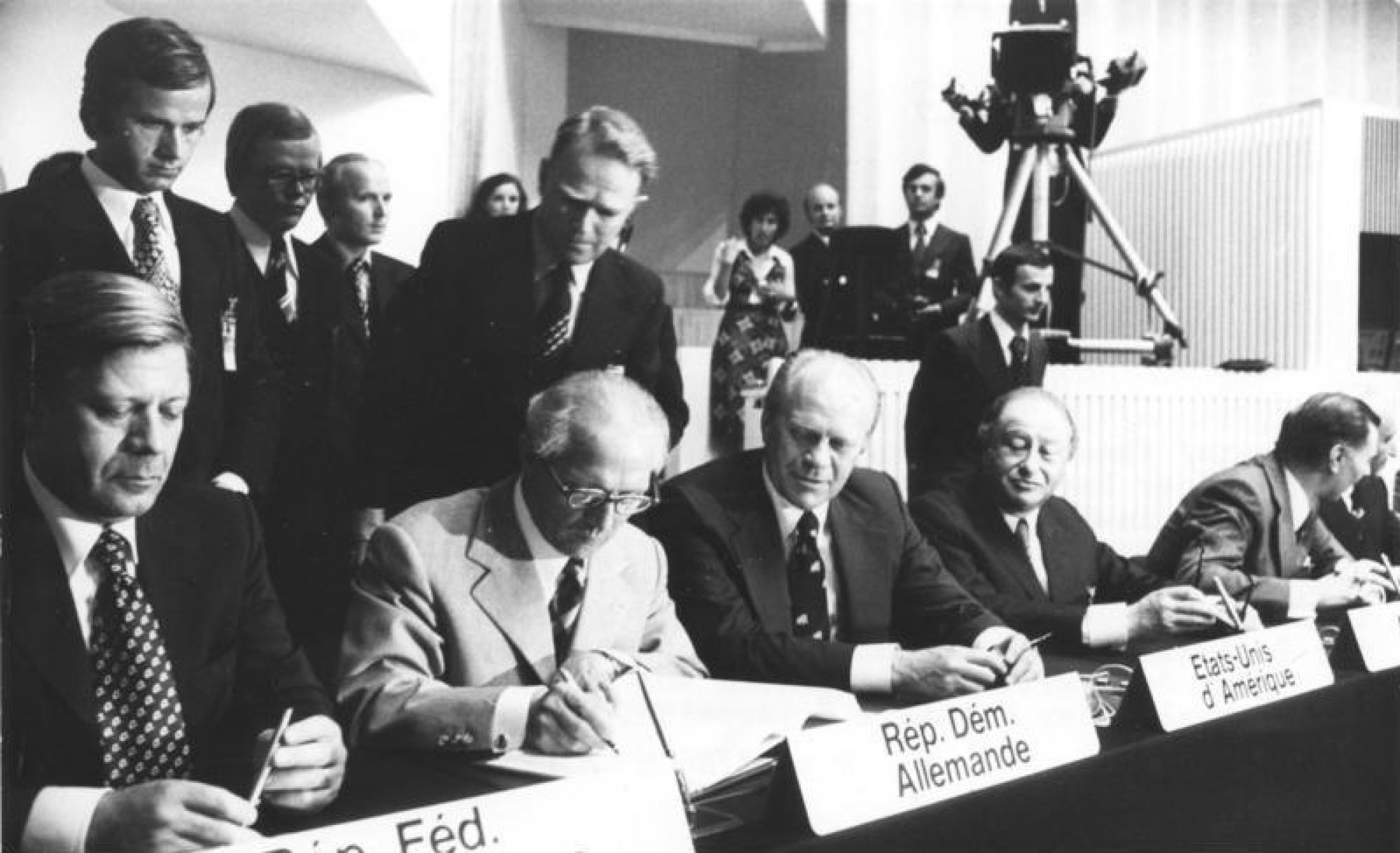L-r: Helmut Schmidt, Chancellor of the Federal Republic of Germany, Erich Honecker, First Secretary of the Socialist Unity Party of Germany, Gerald Ford President of the United States, Bruno Kreisky, Chancellor of Austria, sign the Helsinki Final Act. Helsinki, 1 August 1975. (Bundesarchiv/Horst Sturm)

The USA could be violating the Helsinki Final Act
Until very recently, it was hard to conceive that the United States would consider policy options that could potentially violate the fundamental principles of international law, thereby posing serious threats to international peace and stability and undermining the essence of the international legal order.
While past U.S. actions have often been difficult to reconcile with international norms—such as interventions in Iraq, Libya, and elsewhere—the current policy plans appear to go further by directly undermining the international legal order itself.
The Trump administration’s apparent plan to consider a de jure recognition of Russia’s annexation of Crimea as part of a broader peace agreement in Ukraine would clearly violate the 1975 Helsinki Final Act, a key document that has served as the foundation of European security for the past half-century.
The Decalogue of Principles Guiding Relations between Participating States constitutes a core element of the Helsinki Final Act. Although the document is only politically binding, it has gained significant authority over the years and is now generally regarded as having the status of customary international law. Its fundamental principles underpin shared security in the Eurasian region.
One key element worth highlighting is the third Principle of the Decalogue: the “inviolability of frontiers.” In this principle, all participating States commit to “refrain from any demand for, or act of, seizure and usurpation of part or all of the territory of any participating State.” This commitment has been, and remains, a cornerstone of the European security order.
That is not to say that frontiers can never be changed. However, as clearly stated in the first Principle of the Decalogue, frontiers can only be altered “in accordance with international law, by peaceful means and by agreement.”
The Russian aggression against Ukraine, which includes the illegal annexation of Crimea in 2014 and the subsequent illegal annexations of the Donetsk, Luhansk, Zaporizhzhia, and Kherson regions, clearly violates these principles.
Although Russian authorities have attempted to legitimize their actions by organizing so-called referenda among local populations, few countries have recognized these dubious processes. Therefore, recognizing the territorial gains resulting from Russian aggression by Washington would only be feasible with the explicit consent of the Ukrainian government—something that seems to be overlooked by American policymakers.
President Trump’s apparent plan of a potential de jure recognition of Russia’s illegal annexation of Crimea fundamentally undermines the Decalogue of Principles of the Helsinki Final Act and, more broadly, international law. Ironically, this occurs in the year that the Helsinki Final Act marks its 50th anniversary – a year when the importance of those principles for European security and cooperation should in fact be reaffirmed.
It is surprising that the American government is not considering a more cautious approach with regard to Crimea, for example a de facto recognition of the Russian annexation of the Crimea, just like they plan to do with the other Ukrainian regions occupied and illegally annexed by Russia. This strategy would be smarter, allowing continued pressure on Russia to accept a ceasefire or even withdraw. Simply recognizing the Russian annexation of Crimea de jure is a tactically risky policy and legally unacceptable without Kyiv’s consent.
The more cautious approach is not unprecedented. For instance, most Western states never officially recognized the annexation of the Baltic states by the Soviet Union in 1940. Why wouldn’t the U.S. adopt a similar strategy in relation to the Russian conquests of Ukrainian territory, which would better serve American interests by maintaining greater flexibility in relations with Moscow?
It is hoped that U.S. authorities will reconsider their stance. Furthermore, any state that believes in the principles of the Helsinki Final Act should stand up for them. It is high time that not only the Russian Federation returns to full compliance with the Helsinki Final Act, but that the U.S. also refrains from any actions that violate these principles. Until that time, all other OSCE states must hold both countries accountable for their actions and violations of the Helsinki Final Act.
Dr. Arie Bloed is a Security and Justice Expert and Member of the Board of Editors of the Security and Human Rights Monitor.



Comments
* Your email address will not be published